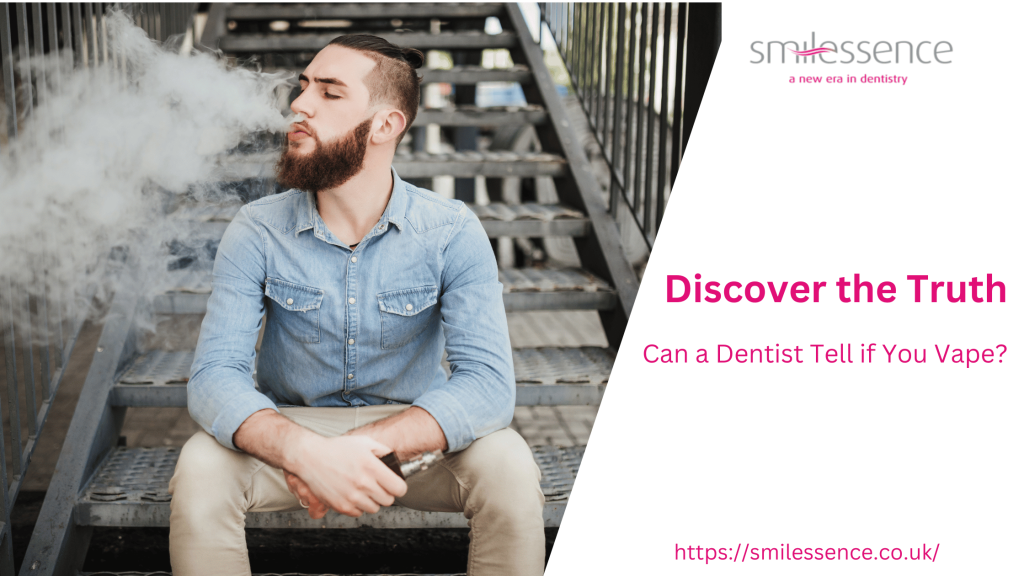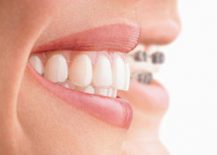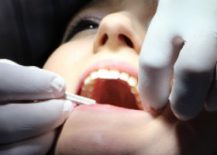
Vaping is becoming quite popular among Brits, especially youngsters. British Government statistics for 2023 show that over 18% of 18-year-old Brits vape regularly. Part of the reason why vaping is becoming so popular is that many consider it a safer alternative to conventional cigarettes. Unfortunately, this is not true. The fact is that vaping is as harmful as tobacco smoking, and it can affect both your physical and oral health. What’s worse is that signs of long-term vaping become visible in one’s teeth and oral cavity.
So, can my dentist tell if I vape? If you have been vaping for a long time, then yes, they will observe changes in your oral cavity caused by e-cigarette use. But how’s that possible? You may ask! You will find the answer to this question in this blog. So, continue reading to learn more about how vaping can affect your teeth and oral health.
Can A Dentist Tell If I Vape THC?
Let’s begin by understanding what THC is. THC stands for tetrahydrocannabinol, the active ingredient in vapes that gives the “high effect”. Studies have shown that THC-containing vaping products can cause lung injury.
Not only this, but your dentist can also tell if you have been using a THC vape on a long-term basis. If you don’t vape frequently or you have just started using one, then your dentist probably won’t be able to tell. However, if you have been vaping for a long time, your dentist may see certain changes in your oral cavity that may point towards the use of vapes.
But how? You may ask! This is because vaping tends to cause dry mouth and stains our teeth. So, frequent vaping may lead to oral health complications such as dry mouth, teeth staining, dental cavities, and gum disease.
Is Vaping Bad For Your Teeth?
Yes, long-term vaping can be bad for your overall health and your teeth. Cannabis or THC-containing vapes can cause dry mouth, a condition characterised by the reduction in the production or flow of saliva in the oral cavity. This can increase the risk of teeth staining, periodontal disease, and tooth decay. More importantly, reduced salivary flow can also cause bad breath. So yes, frequent and long-term vaping can adversely affect your oral health.
Does Vaping Cause Gum/ Teeth Issues?
Vaping can be regarded as a “lesser evil” than smoking when it comes to dental health. According to the British Society of Periodontology and Implant Dentistry, vaping is less harmful than smoking. However, its long-term use can still result in oral health complications such as tooth decay and gum disease. Interestingly, studies have shown a marked reduction in gum disease in smokers who switched to e-cigarettes. So, vaping is not a completely risk-free alternative to smoking in terms of one’s general and dental health.
Does Vaping Promote Tooth Decay Like Cigarettes?
Vaping can increase the risk of tooth decay, especially if you’re not maintaining an optimal oral hygiene routine. As discussed earlier, cannabis-containing vapes tend to reduce salivary flow, leaving the unbathed. As a result, plaque and tartar form on the teeth promoting bacterial adhesion, and initiating a chain of events that results in tooth decay and gum disease.
Does Vaping Make Teeth Yellow?
One of the consequences of long-term vaping is the yellowing of the teeth, especially the ones that contain nicotine. This is because nicotine is yellow in colour. When one frequently uses a nicotine-containing vape, it tends to stick to our teeth and makes them appear yellower. Another reason could be the increased risk of plaque and tartar formation on the teeth due to vaping, which can also cause the teeth to appear yellow.
Can I Smoke An E-Cigarette After An Implant?
It is not recommended to use an e-cigarette for a few months after implant surgery. This is because an implant is surgically screwed into the jawbone and it will require some time to anchor itself firmly. The chemicals in vaping products tend to delay this process and may even cause inflammation in the area leading to implant failure.
Will Vaping Cause Dry Socket?
According to the NHS, a dry socket is a condition where a clot fails to form around a tooth extraction socket. It is regarded as one of the most common complications of tooth extractions. Unfortunately, vaping can increase the risk of dry sockets. This is because nicotine in vapes is a vasoconstrictor, meaning it can constrict the blood vessels around the tooth socket and prevent clot formation and healing. So, vaping should be avoided for a few days after tooth extractions.
Can I Vape With Invisalign?
It is not recommended to vape when wearing your Invisalign clear aligners. This is because the heat from vaping can damage your plastic trays and cause your trays to become unwearable. So, if you want to use a vape while using clear aligners, you should do so when you’re not wearing them.
Does Vaping Turn Your Throat White?
According to the American Lung Association, vaping can negatively affect one’s respiratory system in various ways. First, it can alter the mucous membrane in the throat and other respiratory organs, resulting in a “white throat” appearance. Secondly, the nicotine from vapes deposits on the throats and restricts the airway causing respiratory problems. Moreover, young e-cigarettes are at a higher risk of developing chronic bronchitis, a condition characterised by coughing, chest congestion, and shortness of breath. So, a white throat is not the only respiratory problem you need to be worried about when vaping.
If you’re looking for the best family dentistry specialist in Surrey, England for the treatment of damaged teeth and gums caused by vaping, your best option is Smilessence. We have the best dental team in town to take care of all your dental problems. Whether you are concerned about your inflamed gums or stained teeth, we are here to help you. So, contact us now to book or request more information and let us take good care of your entire family.













